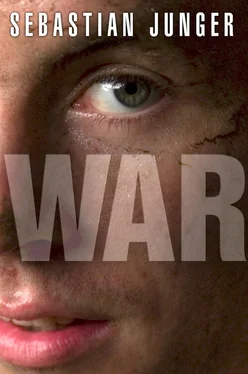I ask O’Byrne if he’ll get bored without any fighting this spring and he stops playing guitar and looks upward, searching for how to put this. “All right, this is how it goes,” he says. “This is the thought process in my head: if we never get shot at again, I won’t mind. But if we do.” He gives me a look. “ I… won’t… mind . Ha-ha-ha!”
It’s early morning and I’m down at Phoenix with Anderson and the rest of Third Squad. Operation Dark City is finally under way but I’ve passed on the chance to go out on it. (An all-night walk with Third Platoon and almost no chance of contact — even Second Platoon guys were telling me it wasn’t worth the night’s sleep.) The sun is warm and I’m up at the guardpost scanning the ridgelines with binoculars. After a while I can pick out Third Platoon on Honcho Hill and a squad from Second Platoon at Table Rock. Near me, Anderson and a medic named LeFave talk down the morning. They have a two-hour guard shift and then they can go back to sleep. Anderson wants to know whether LeFave would sew his finger back on if it got shot off. LeFave doesn’t even look up.
“You can’t just sew a finger back on, you have to reattach all the nerves and shit.”
“Well, if my finger gets shot off I want you to try to save it,” Anderson says. He’s a saxophone player so his request makes sense.
“If your finger gets shot off, I’ll find it and put it in your cargo pouch.”
“Suppose I don’t want it in my cargo pouch?”
“I’ll put it anywhere you want.”
Silence for five or ten minutes. “Maybe it would be cool to be a homicide detective,” Anderson finally says.
“Why?”
“Well, it’s not like we haven’t seen enough dead bodies out here.”
“Yeah, but you have to be all creepy and shit,” LeFave answers. “You’d have to think like a killer.”
“Well,” Anderson says, “that sure as hell wouldn’t be hard.”
Daylight only lasts six or seven hours but there’s so little work at Restrepo that even that feels endless. The men fill up their time as best they can. One morning Gillespie conducts a “law of war” class in which he goes over what is and isn’t legal in terms of killing people. (“As much as you hate the Taliban and Al Qaeda, they’re still people. Napalm? If you can get away without using it, so much the better.”) There are a lot of squad brawls, and one man clears his hooch instantly by pulling out a hand grenade and waving it around. Steiner, Lambert, and Donoho put on “Touch Me,” by Gunther and the Sunshine Girls, and briefly turn the First Squad hooch into a gay disco. Mace toboggans through the outpost on a flexible Skedco litter after a particularly heavy snowfall. O’Byrne receives a random care package from a high school girl that contains two hundred toothbrushes — more than enough for an entire company. She also sent pink plastic soap dishes. (“Are you serious? We make fun of each other out here enough as it is.”) One morning O’Byrne walks past me muttering, “Fuckin’ pervert,” about a platoonmate he accidentally caught committing a private act in his bunk. Jones wanders around the outpost wearing a fake afro with a purple plastic pick jammed in the back. He says he’s going on patrol that way, helmet balanced on the top of all that hair, until O’Byrne points out it’ll only aggravate the local rednecks.
The guys are experts, of a sort, at being funny, and they seem to go out of their way to be. Maybe it’s the only way to stay sane up there. Not because of the combat — you’re never saner than when your survival is in question — but because of the unbelievable, screaming boredom. “Okay, who’s going to die today?” was a standard one-liner before patrols. (“Hey, Anderson, what do you want on your tombstone?” I heard someone ask before we all headed down to Karingal. “Now that’s fucked up,” Anderson muttered as he put on his helmet.) Before patrols, guys promised their laptops to each other or their new boots or their iPods. One pair of friends had a serious agreement that if one of them should die, the other would erase all the porn on his laptop before the Army could ship it back to his mom. Mothers were an irresistible source of humor. “If I start bangin’ your mom when we get home, will that mean I’m your dad?” — or some version of that — was pretty much boilerplate humor at Restrepo. Once I watched O’Byrne grab someone’s ass and give it a good, deep squeeze. When the man demanded an explanation O’Byrne said, “Just trying to get an idea what your mom’s ass is gonna feel like when we get home.” Only wives and girlfriends are off-limits because the men are already so riddled with anxiety over what’s going on back home that almost nothing you could say would be funny. Anything else — mothers, sisters, retarded nephews — is fair game.
Not all the humor involved gutting your best friend’s personal dignity. Donoho would pretend to see obstacles on night patrols and climb over them so he could watch the next guy in line try to do the same thing. Money ate a two-pound bag of tuna in one sitting just to see what would happen. O’Byrne and Sergeant Al fashioned a tarantula out of pipe cleaners to slip into my sleeping bag. (They giggled like schoolgirls while they were making it so I knew something was up.) Some of the men were deeply, intentionally funny, others — like Money — were inadvertently funny, and a few seemed to act as fulcrums for a sick hilarity that could well up from almost anywhere. Jones was one of those. He was the only black guy in the platoon, and that alone made him an irresistible source of humor. That was also true of Kim, the only Asian, and Rueda, who looked awfully Indian. (He had no idea whether he really was or not, but O’Byrne called him “Apache” anyway.)
Not only was Jones the only black guy in the platoon, he was one of only five in the entire company and he’d clearly given the matter some thought. “Black people don’t jump out of planes,” he told me when I asked him why there weren’t more blacks in the unit. The platoon was on ambush west of Restrepo and we had a lot of time to kill. “Black people don’t want to come out here and get shot at. It’s not what they do. Most times black folks join the Army because they’re trying to get a skill set to do something else with their life. I get plenty of shit around here for being the only black dude, but ninety-eight percent of the time it’s all in good fun. You’re gonna run across some guys out there who don’t like me, I guaran-god-damn-tee it, but at the same time I bet there’s not one of ’em that would say, ‘I wouldn’t take him in a firefight.’ And that’s what I’m looking for. I don’t need you to like me, but I need you to respect me. I need you to want to go to war with me.”
Jones had a kind of rangy muscularity that made him seem capable of going to the Olympics in virtually anything. He roamed Restrepo like some kind of alpha predator, and if you caught his attention, you didn’t know whether he was going to jump you, look right through you, or drape an arm over your shoulder and ask how you were doing. He exuded a strange, sullen anger that never quite came to the surface but instead wound up getting slid between your ribs as a casual observation that was devastating because it was so accurate. He dubbed one officer “Chinless the Fearless” and probably wouldn’t have even bothered except that the guy really was fearless. He was fond of giving someone a dismissive look and saying, “Just a mess . A soup sandwich. Just a goddamn mess.” I liked him tremendously. I think it took most of the year for him to say more than two words to me.
“Personally, I don’t give a fuck, you know what I mean?” he went on to tell me about his life before the Army. “I’ll tell anyone who will listen: I smoked a lot of weed, I sold a lot of drugs, I don’t care who knows it, it’s the way it was. I never got caught, my choice was pretty much on the streets dead, or in jail. I didn’t want either so I joined the Army. And now it’s dead or back home, but I guess the jail thing is out of the fucking equation. My mom raised me better than that, plain and simple. She just raised me better than to be selling drugs. She was the realest person in my life.”
Читать дальше
Конец ознакомительного отрывка
Купить книгу












